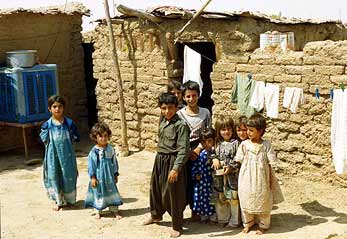Evicted Palestinians in Baghdad to receive UNHCR aid
Evicted Palestinians in Baghdad to receive UNHCR aid

GENEVA, May 9 (UNHCR) - The UN refugee agency announced today that it has sent a convoy of aid to help newly-displaced Palestinian refugees in Baghdad amid concerns of a backlash against them in post-war Iraq. UNHCR has also expressed concern about the expulsion of scores of Iranian refugees in southern Iraq.
According to recent reports from the Iraqi capital, some 1,000 Palestinians have been evicted from their homes since the end of the war. Some of them are camping in disused schools and other abandoned buildings, as well as on plots of open land in Baghdad.
On Friday, a three-truck UNHCR convoy crossed from Jordan into Iraq with emergency supplies for up to 2,000 people, including 400 tents, 1,200 mattresses and 2,000 blankets as well as stoves, jerry cans and soap. The convoy is due to arrive in Baghdad later the same day, when the Palestinian Red Crescent will help distribute the aid materials to the homeless Palestinians.
UNHCR fears that more of the estimated 60-90,000 Palestinian refugees living in Iraq could lose their homes. The agency noted that other landlords may reclaim property they were forced to rent out for minuscule sums - sometimes as little as $1 per month - to the Ba'ath government on behalf of the refugees. Since the fall of the regime, these landlords have stopped receiving their rent.
"We're concerned that what we're hearing about evictions may be the start of a backlash," said UNHCR's Chief of Mission for Iraq, Daniel Bellamy. "None of this is the Palestinians' fault, but if the perception is that they were beneficiaries of the former government, then they may suffer as a result."
Many of the Palestinian refugees in Iraq have been there since 1948, or are the descendants of those who came in the wake of the first Palestinian-Israeli conflict. Others were displaced more recently, for example from Kuwait following the 1991 Gulf War. Most of the Palestinians in Iraq live in Baghdad, although there are also small communities located elsewhere in the country who may be facing similar problems.
Unlike Palestinian refugees in the Occupied Territories or in the countries sharing a border with Israel, who fall under the mandate of UNRWA (the United Nations Relief and Works Agency for Palestine Refugees in the Near East), Palestinians in Iraq come under UNHCR's mandate. But until the recent regime change, the refugee agency's assistance to them was largely limited to legal assistance, including the provision of documents. The state provided them with material assistance (including housing and food), medical care and education, under the provisions of Iraq's 1971 National Refugee Act.
This assistance - however basic - may have led to resentment among Iraqi citizens who felt that the Palestinians were getting more government assistance than they were. Concerned that these refugees may become collateral victims of the regime change, UNHCR's Bellamy said, "This is one reason why we want to get back in to Baghdad as soon as the security situation allows."
Palestinian refugees are not the only ones targeted. On Wednesday, a UNHCR team in Basra, southern Iraq, found several Iranian refugee families living in a disused transit centre at the edge of town. The refugees said they had been expelled from their homes in Dujaila - a refugee settlement near Al Kut, about halfway between Basra and Baghdad - and that their property and crops had been confiscated. When the team proceeded to the Iranian border, it found three more Iranian refugee families displaced from Dujaila, trying to get permission to repatriate.
Small numbers of UNHCR staff have recently returned to Basra, and to Erbil in the north. But there are still no international UNHCR staff in Baghdad at the moment. The decision about when and how many UNHCR and other UN agency staff can return there will be made by the UN security agency, UNSECOORD, based on security assessments in the capital.
Prior to the war, the UN refugee agency was also directly assisting some 12,000 Iranian refugees - mostly Kurds - in Al Tash camp west of Baghdad, and more than 9,000 Turkish Kurds in Makhmour camp, south-east of Mosul.
UNHCR has repeatedly expressed concern about a group of around 1,000 Iranian refugees from Al Tash who have been stuck in no man's land at the Jordanian border for more than three weeks, after fleeing from the camp towards the end of the war.
Staff from the refugee agency and its partner agencies have since visited Al Tash and Makhmour camps, which appear to be functioning reasonably well. However, UNHCR's Bellamy said the agency was still anxious to get more international staff back into Iraq to assist the camp communities as well as to deal with the new problems facing the Palestinians. In addition, the agency wants to proceed with preparations for the reintegration of Iraqi refugees expected to return to their home country eventually.








